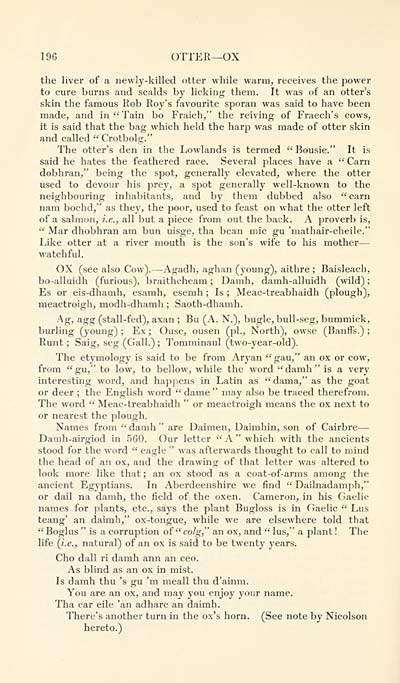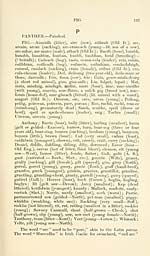Download files
Complete book:
Individual page:
Thumbnail gallery: Grid view | List view

196 OTTER— OX
the liver of a newly-killed otter while warm, receives the power
to cure burns and scalds by licking them. It was of an otter's
skin the famous Rob Roy's favourite sporan was said to have been
made, and in "Tain bo Fraich," the reiving of Fraech's cows,
it is said that the bag which held the harp was made of otter skin
and called " Crotbolg."
The otter's den in the Lowlands is termed " Bousie." It is
said he hates the feathered race. Several places have a " Carn
dobhran," being the spot, generally elevated, where the otter
used to devour his prey, a spot generally well-known to the
neighbouring inhabitants, and by them dubbed also "carn
nam bochd," as they, the poor, used to feast on what the otter left
of a salmon, i.e., all but a piece from out the back. A proverb is,
" Mar dhobhran am bun uisge, tha bean mic gu 'mathair-cheile."
Like otter at a river mouth is the son's wife to his mother —
watchful.
OX (see also Cow). — Agadh, aghan (young), althre ; Baisleacli,
bo-alluidh (furious), braithcheam ; Damh, damh-alluidh (wild) ;
Es or eis-dhamh, esamh, esemh ; Is ; Meac-treabhaidh (plough),
meactroigh, modh-dhamh ; Saoth-dhamh.
Ag, agg (stall-fed), axan ; Bu (A. N.), bugle, bull-seg, bummick,
burling (young) ; Ex ; Ouse, ousen (pi.. North), owse (Banffs.) ;
Runt ; Saig, seg (Gall.) ; Tomminaul (two-year-old).
The etymology is said to be from Aryan "gau," an ox or cow,
from "gu," to low, to bellow, while the word "damh" is a very
intei'esting word, and happens in Latin as "dama,"as the goat
or deer ; the English word " dame " may also be traced therefrom.
The word " Meac-treabhaidh " or meactroigh means the ox next to
or nearest the plough.
Names from "damh" are Daimen, Daimhin, son of Cairbre — -
Damh-airgiod in .560. Our letter "A" which with the ancients
stood for the word " eagle " was afterwards thought to call to mind
the head of an ox, and the drawing of that letter was altered to
look more like that ; an ox stood as a coat-of-arms among the
ancient Egyptians. In Aberdeenshii'e we find " Dailnadamph,"
or dail na damh, the field of the oxen. Cameron, in his Gaelic
names for plants, etc., says the plant Bugloss is in Gaelic " Lus
teang' an daimh," ox-tongue, while we are elsewhere told that
"Boglus " is a corruption of "co/o-," an ox, and " lus," a plant ! The
life (i.e., natural) of an ox is said to be twenty years.
Cho dall ri damh ann an ceo.
As blind as an ox in mist.
Is damh thu 's gu 'm meall thu d'ainm.
You are an ox, and may you enjoy your name.
Tha car eile 'an adharc an daimh.
There's another turn in the ox's horn. (See note by Nicolson
hereto.)
the liver of a newly-killed otter while warm, receives the power
to cure burns and scalds by licking them. It was of an otter's
skin the famous Rob Roy's favourite sporan was said to have been
made, and in "Tain bo Fraich," the reiving of Fraech's cows,
it is said that the bag which held the harp was made of otter skin
and called " Crotbolg."
The otter's den in the Lowlands is termed " Bousie." It is
said he hates the feathered race. Several places have a " Carn
dobhran," being the spot, generally elevated, where the otter
used to devour his prey, a spot generally well-known to the
neighbouring inhabitants, and by them dubbed also "carn
nam bochd," as they, the poor, used to feast on what the otter left
of a salmon, i.e., all but a piece from out the back. A proverb is,
" Mar dhobhran am bun uisge, tha bean mic gu 'mathair-cheile."
Like otter at a river mouth is the son's wife to his mother —
watchful.
OX (see also Cow). — Agadh, aghan (young), althre ; Baisleacli,
bo-alluidh (furious), braithcheam ; Damh, damh-alluidh (wild) ;
Es or eis-dhamh, esamh, esemh ; Is ; Meac-treabhaidh (plough),
meactroigh, modh-dhamh ; Saoth-dhamh.
Ag, agg (stall-fed), axan ; Bu (A. N.), bugle, bull-seg, bummick,
burling (young) ; Ex ; Ouse, ousen (pi.. North), owse (Banffs.) ;
Runt ; Saig, seg (Gall.) ; Tomminaul (two-year-old).
The etymology is said to be from Aryan "gau," an ox or cow,
from "gu," to low, to bellow, while the word "damh" is a very
intei'esting word, and happens in Latin as "dama,"as the goat
or deer ; the English word " dame " may also be traced therefrom.
The word " Meac-treabhaidh " or meactroigh means the ox next to
or nearest the plough.
Names from "damh" are Daimen, Daimhin, son of Cairbre — -
Damh-airgiod in .560. Our letter "A" which with the ancients
stood for the word " eagle " was afterwards thought to call to mind
the head of an ox, and the drawing of that letter was altered to
look more like that ; an ox stood as a coat-of-arms among the
ancient Egyptians. In Aberdeenshii'e we find " Dailnadamph,"
or dail na damh, the field of the oxen. Cameron, in his Gaelic
names for plants, etc., says the plant Bugloss is in Gaelic " Lus
teang' an daimh," ox-tongue, while we are elsewhere told that
"Boglus " is a corruption of "co/o-," an ox, and " lus," a plant ! The
life (i.e., natural) of an ox is said to be twenty years.
Cho dall ri damh ann an ceo.
As blind as an ox in mist.
Is damh thu 's gu 'm meall thu d'ainm.
You are an ox, and may you enjoy your name.
Tha car eile 'an adharc an daimh.
There's another turn in the ox's horn. (See note by Nicolson
hereto.)
Set display mode to: Large image | Transcription
Images and transcriptions on this page, including medium image downloads, may be used under the Creative Commons Attribution 4.0 International Licence unless otherwise stated. ![]()
| Early Gaelic Book Collections > Blair Collection > Gaelic names of beasts (mammalia), birds, fishes, insects, reptiles, etc > (222) |
|---|
| Permanent URL | https://digital.nls.uk/79331911 |
|---|
| Description | A selection of books from a collection of more than 500 titles, mostly on religious and literary topics. Also includes some material dealing with other Celtic languages and societies. Collection created towards the end of the 19th century by Lady Evelyn Stewart Murray. |
|---|
| Description | Selected items from five 'Special and Named Printed Collections'. Includes books in Gaelic and other Celtic languages, works about the Gaels, their languages, literature, culture and history. |
|---|

